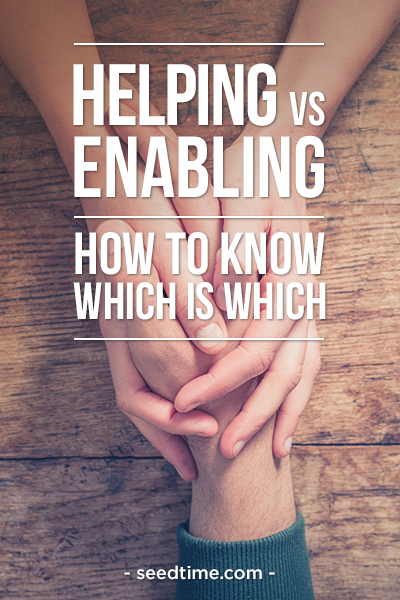 What are some guidelines?
What are some guidelines?
First, some definitions:
- Helping is doing something for someone else that they are not capable of doing for themselves.
- Enabling is doing things for someone else that they can and should be doing for themselves.
Sounds simple, doesn’t it? Yet we all too often find ourselves enabling instead of helping.
Why does this happen?
-
Knowing the difference is hard work.
We could simply be too lazy to discern whether we are really helping or not. It is easy to throw money at an issue and pat ourselves on the back, thinking, “Well, I have done my part. How the gift is received is not my problem.”
Maybe not, but continually giving without following up on how the gift was used is your problem. Yes, doing so is a hassle, but if you continually buy groceries for a friend who doesn’t know how to manage his money, you are not helping.
-
We think suffering is always bad.
None of us like to see someone suffer, but preventing suffering is often not wise. I have a 40 year old friend who vividly recalls the time when, as a teenager, he was arrested for drinking and driving. Upon being notified by the police, his father chose to leave him in jail overnight instead of bailing him out. Furthermore, the dad sold his son’s truck.
I know this father and am absolutely convinced that he was deeply empathetic of his son’s plight. I doubt if this father slept much knowing his son was in jail, but he wisely allowed his son to suffer the consequences of his actions. By the way, the son never drove after drinking again.
-
We might like the feeling of control.
This one is more prevalent with enabling parents, but it works like this: mom or dad just can’t allow those apron strings to be cut, so they will allow a grown child to continue to live at home, often paying Junior’s bills and letting him get by with doing little to improve himself.
The parent, in a perverted way, allows his son or daughter to become co-dependent so he can maintain control over the child.
-
We can’t deal with the strife.
Again, this one is specific to parents. The child needs to be told “no”, but the parent would rather enable the child than deal with the ensuing strife that “no” brings.
Whether it be a toddler who throws a tantrum in the grocery store aisle or the adult child who begs for rent money, mom or dad will too often acquiesce because they can’t handle the consequences of tough love.
What should we do?
-
Realize that God expects us to be good managers of his resources.
Simply giving without requiring accountability is irresponsible. We need to develop discernment to help us know the difference between helping and enabling.
-
Allow God to work.
When you intervene by not allowing someone to suffer the consequences of his actions, you are limiting how God can work in that situation. Galatians 6:7 tells us, “Don’t be misled—you cannot mock the justice of God. You will always harvest what you plant”. Allowing another to suffer those consequences is, in effect, partnering with God.
Remember: comfortable people have zero motivation to change their behavior. Hebrews 12:11 is an apt reminder: “No discipline is enjoyable while it is happening—it’s painful! But afterward there will be a peaceful harvest of right living for those who are trained in this way”.
-
Guard your heart.
It would be easy to smugly say, “He is getting what is owed to him.” While this may be true, we need to continue to pray for this person, encourage him and wish him the best.
-
Grow a backbone.
It all boils down to saying “no” when we find ourselves doing things for someone who could and should be doing it for himself. This is especially tough with friends and family, but that “no” can be the best help we could ever offer.
Concluding thoughts
God expects us to be both helpful and wise. Part of that wisdom involves monitoring our help to make sure we are not enabling. Sometimes the very best help is a loving and firm “no”.
If you enjoyed this article, be sure to check out 5 Bible verses about money!




